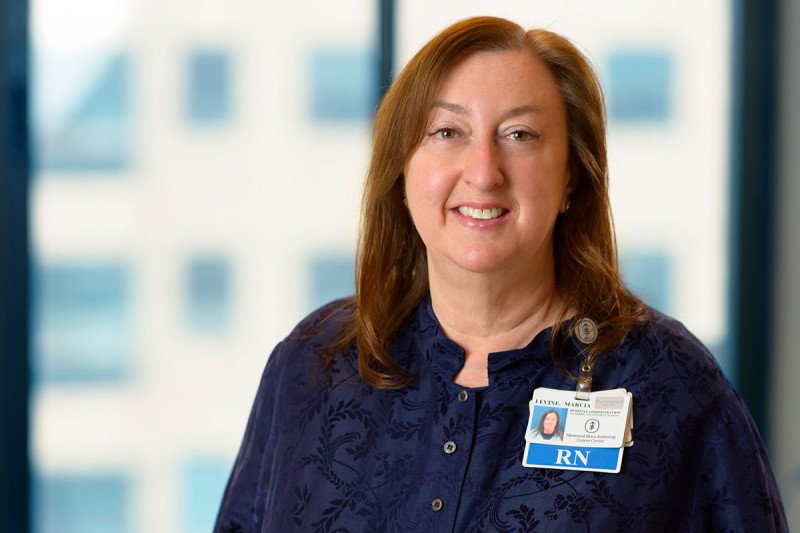
Marcia Levine didn’t grow up wanting to be a nurse. It’s a career that found her, providing a direction for the desire she always had to help, to fix things, to care for others.
Born in Brooklyn, she lived in East Flatbush until she was 12 and then moved with her parents and younger sister to Canarsie. Her mom was a teacher, and her dad was an art importer/exporter until he was diagnosed with multiple sclerosis when Ms. Levine was 7 years old. Although her father’s illness was a constant presence in her life, her childhood was happy, filled with friends who joined her in excursions to Prospect Park, Coney Island, and Sheepshead Bay. Her mom was the director of a Girl Scouts camp, so every summer Ms. Levine and her sister enjoyed a couple of weeks of boating, swimming, and fine-tuning their skills at arts and crafts. She still remembers her master work — a 6’ x 3’ hook rug owl.
When a Career Knocks on Your Door
Although she didn’t have precise career goals, Ms. Levine’s plan had always been to attend Stony Brook University on Long Island. But around the time she graduated from high school, her father had a relapse, and Ms. Levine decided to stay home and help care for him. To contribute financially to her family, she took part-time jobs working for a dentist and in a lab at South Nassau Community Hospital. She also volunteered as an EMT and took classes at Brooklyn College. It was a comprehensive crash course in numerous healthcare fields and a variety of caregiving roles.

By 1991, the nursing shortage had grown so acute that South Nassau Hospital, where Ms. Levine was still working, offered to cover the full cost of nursing school for any interested employee, with the hope of eventually transforming staff into newly minted nurses.
“I thought, ‘Why not?’” she remembers. “It was not my dream to be a nurse, but it was a direction to pursue, at no cost, and I took it.”
She got her licensed practical nurse degree and then enrolled in the Helene Fuld College of Nursing where she earned her RN degree in one year, finishing in the top five of her class. Only then did she discover that South Nassau couldn’t immediately offer her a job as a nurse because they didn’t hire new graduates. Her job search began.
“I interviewed at Weill Cornell Medical Center and the nursing director said, ‘You’re an EMT. You’ve worked in a lab. I’m going to take a chance on you,’ and she hired me to work in the surgical trauma ICU [intensive care unit],” Ms. Levine remembers. “My career has been a lot about being in the right place at the right time — and meeting the right people.”
During her years at Weill Cornell, she worked in the surgical trauma ICU, conducted trauma critical care clinical trials, and helped develop and open the neuro-ICU. Her next move took her to Columbia University Irving Medical Center where she was Nurse Leader in Perioperative Services.
At some point, she briefly considered a major career change. “I wanted to go to cooking school,” Ms. Levine explains. “That was my plan — until I got a call from a recruiter.”
The recruiter told her that NewYork-Presbyterian Queens Hospital was looking for someone to build a surgery program there. Would Ms. Levine consider interviewing?
NYP Queens proved to be a happy home for Ms. Levine for over seven years. She decided there were only two things that would cause her to leave: the chance to work in Manhattan, where she had been living since 1997, or the chance to work at Memorial Sloan Kettering Cancer Center.
“It had never occurred to me to apply to MSK because I had never worked in cancer,” says Ms. Levine. She was familiar with MSK’s reputation and had friends and family members who had received care at MSK — but she didn’t think it was a place for someone with her surgical background.
Then she received a call from a friend and former colleague who had moved to MSK, Laura Ardizzone, now Clinical Director of Nurse Anesthesia Services. Ms. Ardizzone strongly suggested she apply for a leadership position at the Josie Robertson Surgery Center (JRSC).
Ms. Levine joined MSK in February 2015 as Nursing Director of the JRSC. In 2016, Elizabeth McCormick, MSK’s Chief Nursing Officer, asked her to serve as Senior Director of Perioperative Services, overseeing both the JRSC and main campus. In July 2020, she was promoted into her current role of Vice President of Perioperative & Inpatient Nursing Services.
Saving the World One Patient at a Time
Ms. Levine’s need to help others isn’t confined to her day job. Since 2012, she has been passionately dedicated to medical mission work, which she performs with an organization called Operation International. She met head and neck surgeon Shawn Ciecko at a fundraiser in 2010, and the two of them formed a divisional group, Operational International Team ENT, then recruited and organized a medical team to travel internationally, assisting people in impoverished communities.
“We travel to Central America, South America, and the Philippines to perform head and neck and reconstructive plastic surgeries,” she says. “It’s the other side of my life and very important to me.”
For a week or two every year, Ms. Levine and her team treat patients with a wide range of head and neck tumors. They operate primarily out of a hospital in Guatemala City where they have access to an ICU, performing 70 to 80 surgeries a week.
“The patients we see have sometimes been waiting for treatment for years,” says Ms. Levine. “Even in those cases where the tumor is benign, the impact of the surgery is transformative — you can see it immediately. Suddenly, they’re smiling, even in the recovery room.”
In honor of her tremendous work in bringing lifesaving care to people in severe need, she was one of 20 nurses to receive the Inspiring Global Nurse Award from the United Nations in 2019.
Although COVID-19 prevented the team from traveling in 2020, they’re headed back to Guatemala in November 2021.
Facing Down COVID
Since early 2020, Ms. Levine has helped lead MSK’s COVID-19 response. When key colleagues became infected with the virus during the spring of 2020, Ms. Levine felt the heavy weight of her responsibilities.
One of the first things she did was leverage the outstanding teams around her.
“I have a very strong perioperative team and pulled them in,” she says. She also notes the incredible support she received from many individuals, including Matt Kennedy, Director of Radiology & Endoscopy Nursing, and Jackie Burns, Director of the Patient Flow Command Center.
“Everybody was great,” says Ms. Levine. “Nobody ever said ‘no’ to anything. All I ever heard was, ‘What do you need?’”
She is especially proud of the staff on the 18th floor of Memorial Hospital, which became an ICU for patients with COVID-19 and where COVID-positive patients continue to be cared for. “Nurses really stepped up to the plate everywhere, but that floor deserves a special shout-out. They were always there, every day, doing an amazing job — and still are.”
Ms. Levine oversaw a restructuring of nursing processes and procedures that had to happen almost overnight when the pandemic first struck. This was followed by a massive staff education and redeployment initiative as the initial days of the pandemic turned into weeks and then months.
“We had a lot of staff out sick with the virus,” she recalls. “We had to pull people in from Outpatient and send them to boot camp to learn about taking care of inpatients. It was a huge effort.”
Since elective surgeries were paused at the height of the pandemic, surgical staff were redeployed in a variety of ways to help wherever it was needed. Central Processing Technicians — who oversee the cleaning and distribution of instruments used in surgeries — went to help in the kitchens and serve food to patients and assist Environmental Services. And operating room nurses and surgical technicians became members of the Proning Team, turning COVID-19 patients on to their stomachs to help them breathe more easily.
Solace and Strength
Like everyone else, Ms. Levine had moments during the pandemic that tested her ability to cope. But she found comfort outdoors — she walked her commute every day and on occasional weekends, she’d drive up to Westchester and relax in a friend’s backyard. She sat on the terrace of her apartment and looked at the city from a safe distance.
She also found solace and strength in the company of her colleagues, especially the “COVID sorority” of Diane Reidy-Lagunes, Mini Kamboj, Monika Shah, Debbie Korenstein, Rosanna Fahy, and Liz Rodriguez. “They were incredible partners,” she says. “We really leaned on each other and pulled each other through.”
While she never did make it to cooking school, Ms. Levine still loves to cook — her favorite dishes are from her mom’s handwritten cookbook, which was passed down to her. Feeding people is, after all, another way of caring for them.

